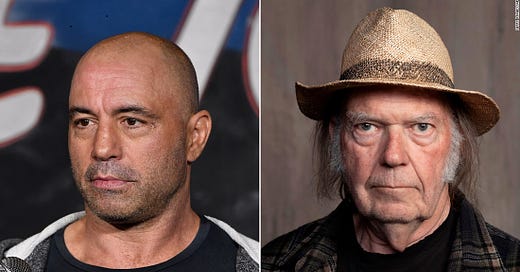Gum-fight Showdown: How Joe Rogan, Whoopi Goldberg, and Naked Jewish Mice Are Shaping Free Speech in America
Who Should Be Banned, Boycotted, or Berated?
A man hears what he wants to hear
And disregards the rest.
Paul Simon, “The Boxer”
The recent Spotify dustup between Joe Rogan and Neil Young has been framed by pundits as a generational grudge match about Freedom of Speech.
I wish it was.
Instead, it’s an amateur-theater reenactment of the Tower of Babel, in which we’re using the same familiar words but still speaking unintelligibly to each other. Throw into the mix Whoopi Goldberg’s suspension from The View, Jenny Nguyen’s firing by Bravo, and the Pulitzer Prize-winning Maus being banned in some Tennessee schools and we realize that for most of us free speech will not be defined by legislators pandering for votes, but by the relentless Thunderdome of popular culture.
This is a reader-supported newsletter. Both free and paid subscriptions are available. The best way to join the community and support my work is by taking out a paid subscription.
“Shut up and gimme free speech!”
On the surface, American discourse on the subject seems to be just a bunch of ill-tempered Yahoos self-righteously screaming, “Shut up and gimme free speech!”
But the truth they can’t fathom is that there never has been such a thing as “free speech”—and rightfully so. What we do have is free-ish speech, and the current tumultuous debate about what that means is as crucial as anything else going on in politics right now. All other political and social issues—abortion, civil rights, infrastructure, LQBTQ+ rights, etc.—depend on who has the right to say what and how we say it. Democracy depends on it. What happens to Joe and Whoopi defines America.
Lots of people find Mel Gibson’s impassioned address to his troops in Braveheart a rallying cry for all freedom-lovers. “They may take away our lives,” he screams with fire in his eyes, “but they’ll never take away our FREEDOM!” Sounds great—in theory. The problem comes when we try to practically apply “freedom” in daily life. Sure, Mel, you’re free to paint your face blue or call a female police officer “sugar tits,” but not free to drive drunk where you put others’ lives in danger. Your freedom ends where it puts the health, well-being, and lives of others in jeopardy. We learn that in middle school.
Freedom of speech is even trickier because words have the power to inspire action. Ask any general on the battlefield, coach at half time in the locker room, or civil rights activist proclaiming “I have a dream.” Powerfully articulating the cause can convince people to rise above their fears to risk failure, humiliation, their jobs, and even their lives. A few right words in the right ears can change the world.
Unfortunately, words can also convince people to commit atrocious acts that are the opposite of everything they claim to believe in: Christians lynching Blacks, a country founded by immigrants now attacking other immigrants, and self-proclaimed “freedom-lovers” attempting to overturn a democratic election, violently invade their seat of government, and knowingly spreading a virus that kills their friends and family.
Because words have the power to destroy our country and to kill our people, we need to keep a robust conversation about free speech.
Should Joe Rogan Be Kicked Off Spotify?
It’s important to remember that the First Amendment is not about free speech in general, but only about keeping the government from passing laws restricting free speech. (“Congress shall make no law respecting an establishment of religion, or prohibiting the free exercise thereof; or abridging the freedom of speech, or of the press; or the right of the people peaceably to assemble, and to petition the Government for a redress of grievances.”) That gives private businesses like Twitter, Facebook, TikTok, and Spotify most the power when it comes to regulating what is and is not permissible on their platforms.
When it comes to corporate America, few make their policy decisions based on ethics or morality. They follow the business school mantra of “The bottom line is the only line.”
The gum-fight showdown between Neil Young and Joe Rogan was basically over Rogan’s podcast featuring misinformation about COVID-19 treatments that encouraged vaccine hesitancy. I’ve read conflicting reports about whether or not Rogan himself is currently vaccinated but, regardless, his decision to send this misinformation out to his 11 million daily listeners has real-life consequences. Over 900,000 have died from COVID-19, hundreds of thousands of which were preventable. In fact, the U.S.’s vaccination program has prevented an estimated 1.1 million deaths and 10.3 million hospitalizations.
It’s statistically likely that Rogan’s show is responsible for at least a few of those deaths. It’s not unlike 17-year old Michelle Carter being convicted of involuntary manslaughter by encouraging her 18-year-old boyfriend Conrad Roy to commit suicide. To not get vaccinated and then die is suicide. To not get vaccinated and infect someone else who dies is manslaughter. Instead of pandering to his base, Rogan could have been saving their lives. For that, Rogan and Spotify share some culpability. That’s why 270 medical experts signed a letter asking Spotify to moderate misinformation.
Still, Rogan shouldn’t be booted from Spotify for that. He made a rational and what seemed like a heartfelt apology and promised to do better in the future. Spotify—late to the party—released some vague guidelines that seemed more corporate ass-covering and PR management than sincerely taking any responsibility.
But the Rogan saga didn’t end there. It got worse.




